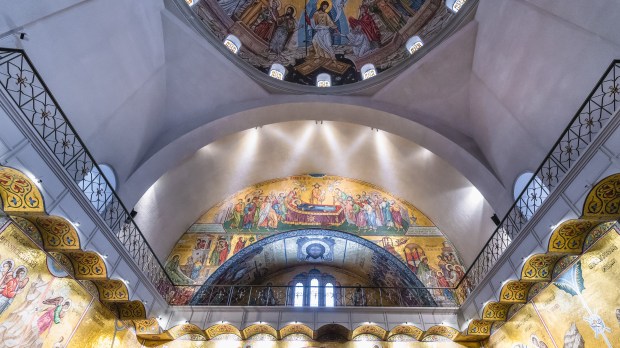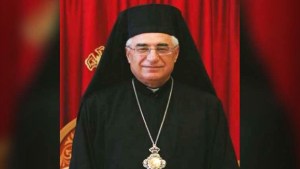Lenten Campaign 2025
This content is free of charge, as are all our articles.
Support us with a donation that is tax-deductible and enable us to continue to reach millions of readers.
The Melkite Greek Catholic Church, one of the 23 Eastern Catholic Churches, is preparing to celebrate the 300th anniversary of its formal declaration of unity with Rome.
Melkite Patriarch Youssef Absi announced on Tuesday that the year 2024 will be a “jubilee year, celebrated under the sign of unity among all Christians, a special time in which we are called to commemorate the 300th anniversary of the restoration of the full Communion between the Melkite Church and the Church of Rome.”
Patriarch Youssef made the announcement during a press conference at the Patriarchate of Antioch’s headquarters in Raboué, Lebanon, according to Fides, the information service of the Pontifical Mission Societies.
“The Synod of our Church did not want this anniversary to pass without us reflecting on the past, present and future path of our Church and her mission,” Youssef said.
The Jubilee Year will open on November 11 with a solemn liturgy presided over by Patriarch Youssef in the Patriarchal Cathedral of Our Lady of the Dormition in Damascus. The program of the Jubilee Year includes liturgical celebrations, study conferences, publications and in-depth historical, theological and ecumenical studies, and exhibitions on the spiritual and artistic heritage preserved by the Melkite communities in the Middle East.
Tracing the history of the Church of Antioch, “founded by the Apostle Peter” and of which the Apostle Paul also belonged, Youssef also recalled the theological disputes and divisions that have divided the Church over the centuries.
Christians who followed the decisions of the Council of Chalcedon in 451 were called Melkites, or “King’s Men,” from the ancient Syriac word for king — “Malko” — because they accepted the correct understanding of Jesus Christ that was shared by the Emperor.
In the Middle East, starting from the 17th century, Western Catholic missionaries “sought to heal the breach and achieve the desired unity between the Patriarchate of Antioch and the Church of Rome,” Youssef said.
Unity with Rome
This effort grew into a “reunification movement,” which, along with other important factors, led to other divisions within the Church of Antioch itself.
In 1724, Patriarch Cyril VI of Antioch affirmed the Melkite Church’s union with Rome that had existed during the first millennium of Christianity. From this time, the “Melkite” Church of Antioch was formally divided between Greek Orthodox (those not in union with Rome) and Greek Catholics (those in union with Rome). The use of the word “Greek” referred to Byzantine liturgical and spiritual tradition that the Melkites had adopted from the Eastern, Greek-speaking Christian world centered on Constantinople. The term “Melkite” began to be associated exclusively with Catholics.
“Since 1724, we have the Melkite Greek Catholic Church and the Greek Orthodox Church,” said the patriarch. Every split has left its mark and led to painful tensions. “But despite all this, the Churches of Antioch have fulfilled their mission of preserving the Christian faith and have overcome all the critical moments they have lived through,” he said. And today, “thanks to Almighty God and the will of those responsible, the relationships between our Church and sister Churches continue to be one of mutual respect, brotherly love and collaboration in the service of the one Gospel, while our faithful often have a privileged experience of gathering under the roof of the same house from different denominations to bear a clear testimony of their belonging to Christ.”
In addition to the ecumenical movement, a factor that has united Christians more and more in the Middle East in recent years has been the persecution they have suffered at the hands of jihadists such as the Islamic State group.
The Melkite Church is active in Syria, Lebanon, and other countries of the Middle East, but due to emigration over the years there are eparchies in Europe, the Americas, and Oceania. The Eparchy of Newton, Massachusetts, has more than 50 parishes and missions throughout the US.


